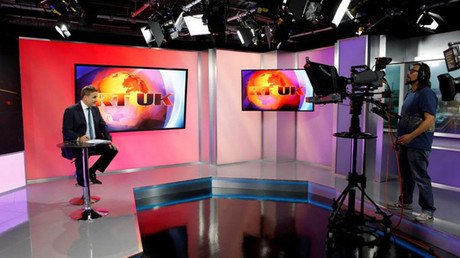‘Blame Russia for everything – part of propaganda campaign to smear politicians’
Elected British officials appear on RT as they can’t get their voices heard on the existing mainstream media. Britain’s The Times runs against open and free debate, denying the democratic process of airing their opinions, says Professor Piers Robinson.
An article in Britain's The Times newspaper suggests UK lawmakers are doing the Kremlin's bidding when they appear in RT's programs.
The Russian embassy in London responded to The Times in a tweet questioning the logic behind the article by asking if Russian politicians by appearing on the BBC help out the British prime minister.
.@Thetimes: by appearing on @RT_com British politicians help Putin. Does it mean that by appearing on @BBC Russian politicians help May? pic.twitter.com/xkhlxr5Ozx
— Russian Embassy, UK (@RussianEmbassy) October 11, 2017
RT discussed this with Professor Piers Robinson, the chair in Politics, Society and Political Journalism at the University of Sheffield
RT: What you think about the claims made in the newspaper about MP's helping Putin by coming on to RT?
Piers Robinson: I think you got to understand the political context here… It is part of a broader propaganda campaign to direct public attention onto Russia and place blame for everything onto Russia. And then, having done that, having placed that in the consciousness of the public - using that as a way of smearing politicians and closing down open debate from those politicians. That seems to be pretty obvious, that has been going on for some time and needs to be seen in those terms as a smear/propaganda campaign. It has ultimately really been driven… by a sort of highly politicized drives trying to marginalize MPs associated with Corbyn.
RT: Jeremy Corbyn has appeared on RT several times. Could we see Corbyn being branded as a glove puppet of President Putin in the future?
PR: …Absolutely, that is a kind of political strategy and that’s the one you see in the US as well in relation to Trump. This is a way of basically smearing or firing up a flag against particular politicians and undermining them by associating them with Russia. It has sort of traces of McCarthyism about the way it is being conducted: listing MPs. You have got to ask yourself exactly what are they afraid of? …These are democratically elected officials who have been allowed to speak and put their views out there. This would normally be seen as a part of democratic process whatever channel might be airing their opinions. For The Times in London to be publishing these kinds of stories - this is really running against democracy, running against open and free debate.
.@TimesKennedy accuses @RT_com of being one-sided, then tells Tory MPs not to voice their opinion there. Stylish. pic.twitter.com/It1JKvN6dJ
— Russian Embassy, UK (@RussianEmbassy) October 11, 2017
RT: Why do you think British lawmakers come on RT?
PR: People are coming on RT in order to express legitimate political views and they are coming onto RT because they are probably having great difficulty getting onto existing ‘legitimate’ mainstream media in the West. In many ways RT is providing an important outlet for these people who are not getting their voices heard elsewhere. People who studied political communication and mainstream media have known, have said, have studies to demonstrate for years that the mainstream media is far too closely located to political power and so on. And one function of that is that people saying things that are a little bit just too critical or are raising problematic issues which challenge power tend to have a hard time getting onto the existing mainstream media. So, whenever [they] have a hard time doing that they are going to media outlets which will get them a voice. And again, to emphasize the point, these are people who are not Kremlin agents, these are elected British officials. Unless The Times goes ahead and suggests that these people in some way are Russian spies on the payroll of the Russians. These are democratically elected people who are voicing their opinions and are going to RT because they can’t get their points of views expressed in the existing mainstream media. In a way, the existing mainstream media are to blame for that journey that they take to RT.













